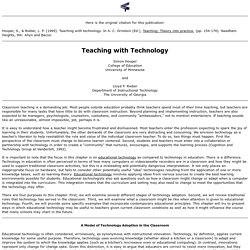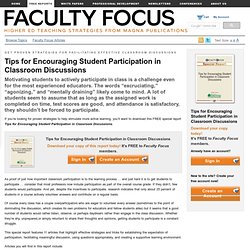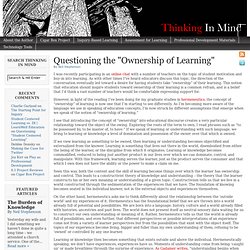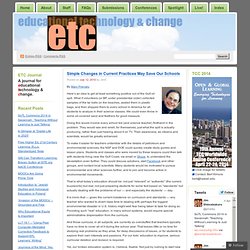

21st Century Fluencies.
Teaching with Technology. Here is the original citation for this publication: Hooper, S., & Rieber, L.

P. (1995). Teaching with technology. In A. C. Simon Hooper College of Education University of Minnesota and Lloyd P. Classroom teaching is a demanding job. It is easy to understand how a teacher might become frustrated and disillusioned. It is important to note that the focus in this chapter is on educational technology as compared to technology in education. There are four purposes to this chapter. A Model of Technology Adoption in the Classroom Educational technology is often considered, erroneously, as synonymous with instructional innovation. Although education has witnessed a multitude of both technology and innovation over the past 50 years (Reiser, 1987), the educational system has scarcely changed during that time.
There have been many attempts to understand patterns of adoption in education (Dalton, 1989; Dwyer, Ringstaff, & Sandholtz, 1991). Figure 1. Familiarization Utilization Integration Reorientation. Www.lth.se/fileadmin/lth/genombrottet/DTR/Table_of_Resources_Academics_Nov_2011.pdf. Www-public.int-evry.fr/~assar/pdf/ETS_Franzoni-Assar.pdf. TechAdopt.
Tools for creating ideas. Theory Into Practice (TIP) KwikSurveys: Offical Free online survey & questionnaire tool. Welcome to Skype in the classroom. Ownership of Learning. Sir Ken Robinson: Bring on the learning revolution! TED: Ideas worth spreading.
Tips for Encouraging Student Participation in Classroom Discussions. Get proven strategies for facilitating effective classroom discussions If you’re looking for proven strategies to help stimulate more active learning, you’ll want to download this FREE special report Tips for Encouraging Student Participation in Classroom Discussions.

Tips for Encouraging Student Participation in Classroom Discussions Download your copy of this report today! It's FREE to Faculty Focus members. As proof of just how important classroom participation is to the learning process … and just hard it is to get students to participate … consider that most professors now include participation as part of the overall course grade. Of course every class has a couple overparticipators who are eager to volunteer every answer (sometimes to the point of dominating the discussion, which creates its own problems for educators and fellow students alike) but it seems that a good number of students would rather listen, observe, or perhaps daydream rather than engage in the class discussion.
Personal Learning Networks. Questioning the "Ownership of Learning" I was recently participating in an online chat with a number of teachers on the topic of student motivation and buy-in into learning.

As with other times I’ve heard educators discuss this topic, the direction of the conversation eventually led toward a desire for having students take “ownership” of their learning. This notion that education should inspire students toward ownership of their learning is a common refrain, and is a belief that I’d think a vast number of teachers would be comfortable expressing support for.
However, in light of the reading I’ve been doing for my graduate studies in hermeneutics, the concept of “ownership” of learning is now one that I’m starting to see differently. As I’m becoming more aware of the language we use in speaking of education concepts, I’m now struck by different assumptions that emerge when we speak of the notion of “ownership of learning.”
Learning or knowledge then becomes something that exists outside and above the individual. Related posts:
Digital Media & Learning. New Learners Of The 21st Century. "The Visions of Students Today" 2011 Remix One (trailer) Critical Thinking. Simple Changes in Current Practices May Save Our Schools. By Marc Prensky Here’s an idea to get at least something positive out of the Gulf oil spill.

What if volunteers (or BP, under presidential order) collected samples of the tar balls on the beaches, sealed them in plastic bags, and then shipped them to every school in America for all students to analyze in their science classes. We could even throw in some oil-covered sand and feathers for good measure. Doing this would involve every school kid (and science teacher) firsthand in the problem. They would see and smell, for themselves, just what the spill is actually producing, rather than just hearing about it on TV. To make it easier for teachers unfamiliar with the details of petroleum and environmental sciences, the NSF and DOE could quickly create study guides and lesson plans. And those curricula, in all subjects, are currently so overstuffed that teachers typically have no time to cover all of it during the school year. Yet, our broken education system is, I believe, fixable.
Collaborative Learning. Backup Education. Tariqyusuf.